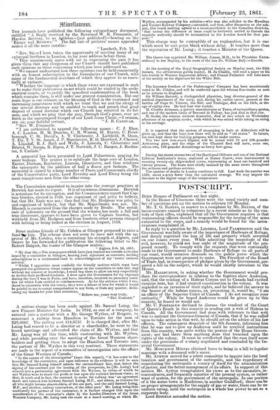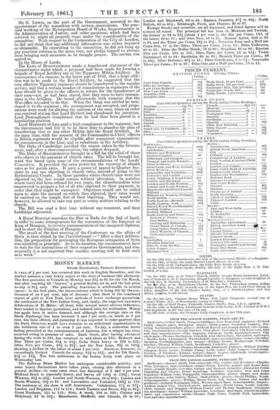POSTSCRIPT.
Born Houses of Parliament sat last night. In the House of Commons there were the usual variety and num- ber of questions put on the motion to adjourn till Monday.
Mr. T. G. BARING, in answer to a complaint by.Mr. Buxton, of the inconvenience caused to volunteers by a recent minute as to the cus-
tody of their rifles, explained that all the Government requires is that commanding officers should be responsible for the issuing of the arms entrusted to the corps, and a remedy would be found for the incon- venience complained of. In reply to a question by Mr. LIDDELL, Lord PALMERSTON said the Government was fully aware of the importance of Harbours of Refuge, and deeply regretted the loss of life and property which occurred on our coasts every year. While admitting the magnitude of the evil, however, he could not lose sight of the magnitude of the pro- posed remedy. To comply with the requests that were continually made to the Government to make Harbours of Refuge on all parts of our coast, would occasion demands on the public purse which the Government were not prepared to make. The President of the Board of Trade had, in consequence of pledges given by the Government, pre- pared a bill on the subject, which he would shortly introduce to the House.
Mr. HALIBURTON, in asking whether the Government would pro- dace the correspondence in relation to the fugitive slave Anderson, said, that the sending of a Habeas Corpus out to Canada had excited surprise here, but it had created consternation in the colony. It was regarded as an invasion of their rights, and he believed the answer to the bearer of the habeas corpus, on presenting it, would be,. "I am an officer of the Superior Court of Canada. I do not recognize your authority." While he hoped Anderson would be given up to this country, he feared he would not. Mr. C. FORTESCUE declined to discuss the conduct of the Court of Queen's Bench in this country in sending out a writ of Habeas to Canada. All the Government had done with reference to that writ was to instruct the Governor-General of Canada, that if he was called upon to take action in that writ, he should act on the advice of his law officers. The subsequent despatch of the 9th January, informin. him that he was not to give up Anderson until he received instructions from this country, was (mite within the powers of the Home Govern- ment; nor had there been anything done that trenched upon the rights of the colony, It must be recollected that the case itself arose under the provisions of a treaty negotiated and concluded by the Im- perial Government.
Mr. MONCILTON MILERS obtained leave to bring in a bill to legalize marriage with a deceased wife's sister. Mr. AYRTON moved for a select committee to inquire into the local taxation and government of the metropolis, and the expediency of constituting the metropolis a county of itself for the administration of justice, and the better management of its affairs. In support of this motion Mr. Ayrton recapitulated his views as to the anomalies, in- conveniences, and frequently injustice of the present system, or rather want of system, for the government of the metropolis. In one portion of it the assize town is .Maidstone, in another Guildford; there can be no.proper arrangements for the supply of gas or water, there can be no uniform rating, until the metropolis as a whole has power to act as a Sir G. Lzwls, on the part of the Government, assented to the appointment of the committee with certain reservations. The prac- tical working of the Metropolitan Board of Works, Improvements in the Administration of Justice, and other questions, which had been referred to, might all properly come under the consideration of the committee With respect to the Corporation of the City of Londo he did not think that any additional information was either require or obtainable. By consenting to the committee, he did not hang up any practical reforms in the mean time, nor pledge himself to abstain from bringing such measures as he thought proper. The motion was agreed to.
In the House of Lords,
The EARL of HONOUGHMORE made a lengthened statement of the circumstances under which a proposal had been made for formmg a brigade of Royal Artillery out or the Tipperary Militia Artillery. In consequence of a rumour i
, n the latter part of 1859, that a large addi- tion was to be made to the Royal Artillery, he suggested that the very effective Tipperary regiment should be transferred to the regular service, and that a certain number of commissions in regiments of the Line should be given to the officers in return for the transference of their men—not, as had been stated, that they were to have commis- sions in the Artillery. He heard afterwards with surprise that the War-office intended to do that. When the thing was settled he men- tioned it to the regiment ; the arrangement was accepted, and prepa- rations were made for altering the uniform of the men, when an order was received stating that Lord Herbert had abandoned his intention. Lord Donoughmore complained that he had thus been placed in a humiliating position.
Lord HERBERT OF LEA paid a high compliment to the regiment, but the Government had felt it to be their duty to abandon the plan of transferring that or any other Militia into the Royal Artillery, At the same time, with the consent of the Commander-in-Chief, officers in Militia regiments would be eligible, after competent examination, for commissions in the Line, and as subalterns in the Artillery.
The Duke of Cambridge justified the course taken by the Govern- ment, and, after a short conversation, the subject dropped. The Duke of MAniziououou brought in a bill for the relief of those who object to the payment of church rates. The bill he brought for- ward was based upon some of the recommendations of the Lords' Committee. It provided the same power for the recovery of church rates as for parish rates. It gave a power of appeal to Quarter Ses- sions by any one objecting; to church rates, instead of going to the Ecclesiastical Courts. In those parishes where church rates were not objected to:the law would remain without alteration, In parishes where rates had been refused for two years, the churchwardens were empowered to prepare a list of all who objected to their payment, in order that they might be exempted. Objectors would not be called upon to state the ground on which they objected, their rates would be omitted on the simple fact of their objecting. They would not, however, be allowed to take any part in vestry matters relating to the church.
The Bill was read a first time without any comment, and their Lordships adjourned.































 Previous page
Previous page